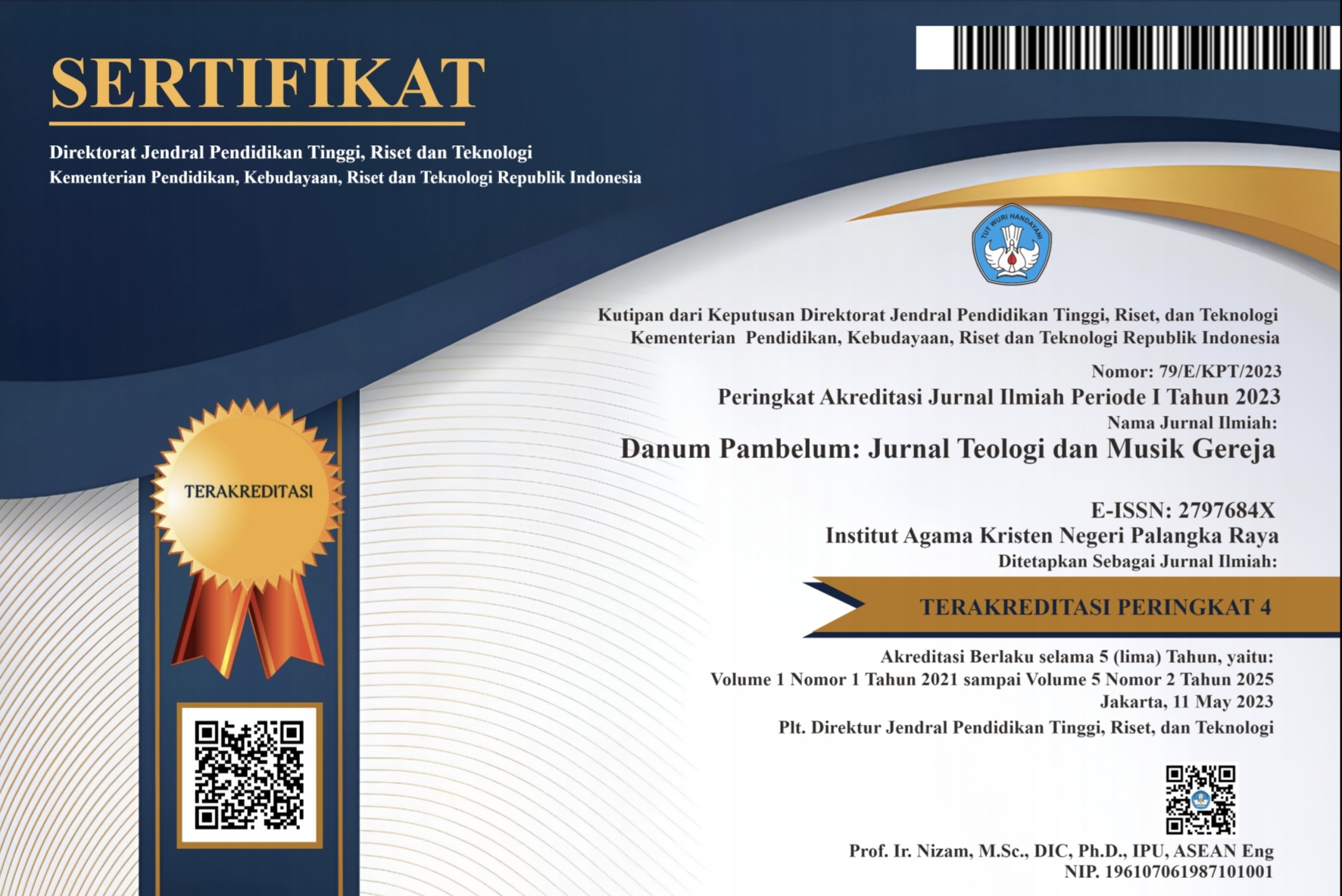Studi Hermeneutika Teks Mazmur 42 dan Implikasinya untuk Pemulihan Mandiri dari Depresi dengan Melakukan Komunikasi Intrapersonal
DOI:
https://doi.org/10.54170/dp.v4i2.398Keywords:
self-healing, psychology, exegesis, psalmAbstract
Man's fall into sin resulted in the human soul being vulnerable and fragile. If not addressed immediately, it will cause social problems. Returning something to its original condition is the goal of restoration. Not only God, individual participation is the main key to turning things around. Instead of demanding that circumstances change, what is more important is to change your personal perspective in dealing with problems, and that is personal responsibility. This process is called self-healing. By using intrapersonal communication methods, an individual is able to become the best healer for himself. Reflecting on the experience of a psalmist in Psalm 42, psychological values are implied that can be applied in today's life to reduce psychological illnesses, such as depression. Through an exegetical approach and integrating it with psychology, a coping mechanism can be formulated that can help believers to carry out self-healing, as first aid.
References
Carter, K., & Seifert, C. M. (2014). Psikologi Umum. Penerbit Buku Kedokteran EGC.
Colbert, D. (2007). Emosi Yang Mematikan (3rd ed.). Immanuel.
Elias, T. F. E., & Marlessy, C. F. (2022). Peran Gereja Terhadap Konseling Pastoral Dalam Menjangkau Penderita Gangguan Jiwa Di Wilayah Kota Sorong. EIRENE Jurnal Ilmiah Teologi, 6(1), 229–251. https://doi.org/10.56942/ejit.v6i1.11
Habibitasari, B. B. (2021). Self Healing Melalui Komunikasi dengan Diri Sendiri. Stikesbanyuwangi.Ac.Id. https://stikesbanyuwangi.ac.id/self-healing-melalui-komunikasi-dengan-diri-sendiri/
Himawan, K. K., & Mutiara, E. (2014). Integrating Psychology and Christianity: the Enrichment Model (1st ed.). Penerbit Gandum Mas.
Jeste, D. V., Lieberman, J. A., Fassler, D., & Peele, R. (2013). Diagnostic and Statistical Manual of Mental Disorders, Fifth Edition. American Psychiatric Association. https://ia800900.us.archive.org/0/items/info_munsha_DSM5/DSM-5.pdf
Lazarus, R. S., & Folkman, S. (1984). Stress, Appraisal, and Coping. Springer Publishing Company.
Lieberman, D. J. (2007). Analisis Instan (1st ed.). PT Serambi Ilmu Semesta.
Pareira, B. A. (2019). Dimanakah Allahmu? Teologi Mazmur 42-43 Bagi Orang di Zaman 4.0. Siapakah Manusia; Siapakah Allah (Menyingkap Tabir Manusia Dalam Revolusi Industri Era 4.0), Vol. 29 No, 117–130.
Perianto, E. (2021). Self Healing Bagi Peserta Didik Dan Orangtua Pada Masa Pandemi Covid-19. Jurnal Pendidikan Dan Pengabdian Masyarakat, 4(4). https://doi.org/10.29303/jppm.v4i4.3037
Pettit, D. P. (2023). Longing for Flowing Streams—Water as Metaphor and Mediator in Psalm 42. Scandinavian Journal of the Old Testament, 37(2), 251–261. https://doi.org/10.1080/09018328.2023.2267885
Puspita, D., & Sutami, H. (2020). Pendefinisian Objek Dan Pelengkap Dalam Kamus Besar Bahasa Indonesia Sebagai Penunjang Literasi. Linguistik Indonesia, 38(2), 179–191. https://doi.org/10.26499/li.v38i2.157
Reni, E. M. N. (2023). Pengaruh Therapy Self-Talk terhadap Penurunan Stres pada Remaja akibat Pandemi COVID-19. JIK: Jurnal Ilmu Keperawatan, 1(1), 41–50.
Runturambi, S. (2023). Studi Eksegesis Hakim-Hakim 11:1-11 Sebagai Model Pelaksanaan “Self Inner Healing” dan Aplikasinya bagi Pelayanan Konseling. Jurnal Teologi GLOW, 1(1), 22–30. https://ojs.sttggi.ac.id/index.php/jtg/article/view/3/3
Santoso, J. (2021). Peran Integrasi Teologi Psikologi Terhadap Pemulihan Prilaku Menyimpang. SHAMAYIM: Jurnal Teologi Dan Pendidikan Kristiani, 1(2), 174–187. https://doi.org/10.51615/sha.v1i2.24
Zaluchu, S. E. (2020). Strategi Penelitian Kualitatif dan Kuantitatif Di Dalam Penelitian Agama. Evangelikal: Jurnal Teologi Injili Dan Pembinaan Warga Jemaat, 4(1), 28. https://doi.org/10.46445/ejti.v4i1.167






